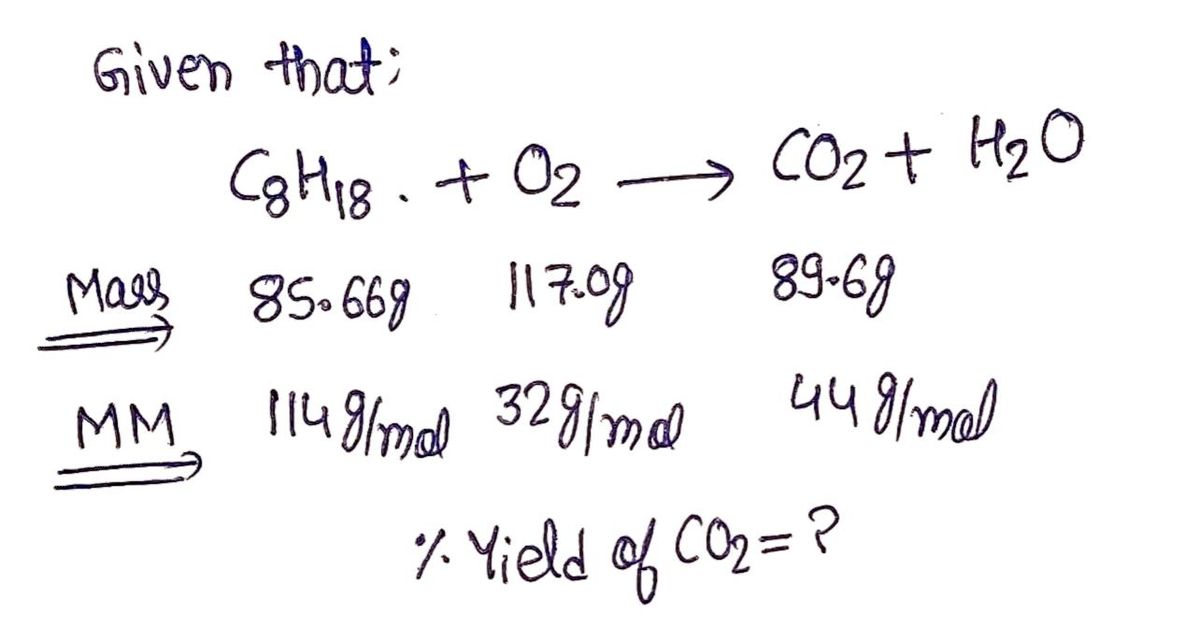reacts with gaseous oxygen gas (0₂) to produce gaseous carbon dioxide (CO₂) and gaseous water (H₂O). If 89.6 g of Liquid octane carbon dioxide is produced from the reaction of 85.66 g of octane and 117.0 g of oxygen gas, calculate the percent yield of carbon dioxide. Round your answer to 3 significant figures. X 3 of
reacts with gaseous oxygen gas (0₂) to produce gaseous carbon dioxide (CO₂) and gaseous water (H₂O). If 89.6 g of Liquid octane carbon dioxide is produced from the reaction of 85.66 g of octane and 117.0 g of oxygen gas, calculate the percent yield of carbon dioxide. Round your answer to 3 significant figures. X 3 of
Chemistry
10th Edition
ISBN:9781305957404
Author:Steven S. Zumdahl, Susan A. Zumdahl, Donald J. DeCoste
Publisher:Steven S. Zumdahl, Susan A. Zumdahl, Donald J. DeCoste
Chapter1: Chemical Foundations
Section: Chapter Questions
Problem 1RQ: Define and explain the differences between the following terms. a. law and theory b. theory and...
Related questions
Question
answer correctly
![I'm unable to transcribe the text from the image directly, but I can help explain it.
---
### Chemical Reactions: Percent Yield of Chemical Reactions
The problem involves the combustion reaction of octane with oxygen to produce carbon dioxide and water. The goal is to calculate the percent yield of carbon dioxide based on the given masses.
#### The Reaction:
\[
\text{Liquid octane} \, (\text{CH}_3(\text{CH}_2)_6\text{CH}_3) \, \text{reacts with gaseous oxygen gas} \, (\text{O}_2) \, \text{to produce gaseous carbon dioxide} \, (\text{CO}_2) \, \text{and gaseous water} \, (\text{H}_2\text{O}).
\]
#### Data Given:
- **Mass of octane used** = 85.66 g
- **Mass of oxygen gas used** = 117.0 g
- **Mass of carbon dioxide produced** = 89.6 g
#### Task:
Calculate the percent yield of carbon dioxide and round the answer to 3 significant figures.
### Explanation:
1. **Balanced Equation**: Write the balanced chemical equation for the combustion of octane.
2. **Theoretical Yield**: Use stoichiometry to calculate the theoretical yield of carbon dioxide from the given masses of octane and oxygen.
3. **Percent Yield Calculation**:
\[
\text{Percent Yield} = \left(\frac{\text{Actual Yield}}{\text{Theoretical Yield}}\right) \times 100
\]
Plug in the values to find the percent yield.
#### Instructions:
Input your solution in the space provided and click "Check" to verify your answer.
---
This explanation covers how to approach solving the problem regarding percent yield in a combustion reaction.](/v2/_next/image?url=https%3A%2F%2Fcontent.bartleby.com%2Fqna-images%2Fquestion%2Ffc5d9ab7-5262-4222-989c-d8b3bd159f6f%2F4119377d-2275-4ece-bb96-06fd9f6b538b%2Fjcox4up_processed.jpeg&w=3840&q=75)
Transcribed Image Text:I'm unable to transcribe the text from the image directly, but I can help explain it.
---
### Chemical Reactions: Percent Yield of Chemical Reactions
The problem involves the combustion reaction of octane with oxygen to produce carbon dioxide and water. The goal is to calculate the percent yield of carbon dioxide based on the given masses.
#### The Reaction:
\[
\text{Liquid octane} \, (\text{CH}_3(\text{CH}_2)_6\text{CH}_3) \, \text{reacts with gaseous oxygen gas} \, (\text{O}_2) \, \text{to produce gaseous carbon dioxide} \, (\text{CO}_2) \, \text{and gaseous water} \, (\text{H}_2\text{O}).
\]
#### Data Given:
- **Mass of octane used** = 85.66 g
- **Mass of oxygen gas used** = 117.0 g
- **Mass of carbon dioxide produced** = 89.6 g
#### Task:
Calculate the percent yield of carbon dioxide and round the answer to 3 significant figures.
### Explanation:
1. **Balanced Equation**: Write the balanced chemical equation for the combustion of octane.
2. **Theoretical Yield**: Use stoichiometry to calculate the theoretical yield of carbon dioxide from the given masses of octane and oxygen.
3. **Percent Yield Calculation**:
\[
\text{Percent Yield} = \left(\frac{\text{Actual Yield}}{\text{Theoretical Yield}}\right) \times 100
\]
Plug in the values to find the percent yield.
#### Instructions:
Input your solution in the space provided and click "Check" to verify your answer.
---
This explanation covers how to approach solving the problem regarding percent yield in a combustion reaction.
Expert Solution
Step 1

Step by step
Solved in 3 steps with 3 images

Knowledge Booster
Learn more about
Need a deep-dive on the concept behind this application? Look no further. Learn more about this topic, chemistry and related others by exploring similar questions and additional content below.Recommended textbooks for you

Chemistry
Chemistry
ISBN:
9781305957404
Author:
Steven S. Zumdahl, Susan A. Zumdahl, Donald J. DeCoste
Publisher:
Cengage Learning

Chemistry
Chemistry
ISBN:
9781259911156
Author:
Raymond Chang Dr., Jason Overby Professor
Publisher:
McGraw-Hill Education

Principles of Instrumental Analysis
Chemistry
ISBN:
9781305577213
Author:
Douglas A. Skoog, F. James Holler, Stanley R. Crouch
Publisher:
Cengage Learning

Chemistry
Chemistry
ISBN:
9781305957404
Author:
Steven S. Zumdahl, Susan A. Zumdahl, Donald J. DeCoste
Publisher:
Cengage Learning

Chemistry
Chemistry
ISBN:
9781259911156
Author:
Raymond Chang Dr., Jason Overby Professor
Publisher:
McGraw-Hill Education

Principles of Instrumental Analysis
Chemistry
ISBN:
9781305577213
Author:
Douglas A. Skoog, F. James Holler, Stanley R. Crouch
Publisher:
Cengage Learning

Organic Chemistry
Chemistry
ISBN:
9780078021558
Author:
Janice Gorzynski Smith Dr.
Publisher:
McGraw-Hill Education

Chemistry: Principles and Reactions
Chemistry
ISBN:
9781305079373
Author:
William L. Masterton, Cecile N. Hurley
Publisher:
Cengage Learning

Elementary Principles of Chemical Processes, Bind…
Chemistry
ISBN:
9781118431221
Author:
Richard M. Felder, Ronald W. Rousseau, Lisa G. Bullard
Publisher:
WILEY